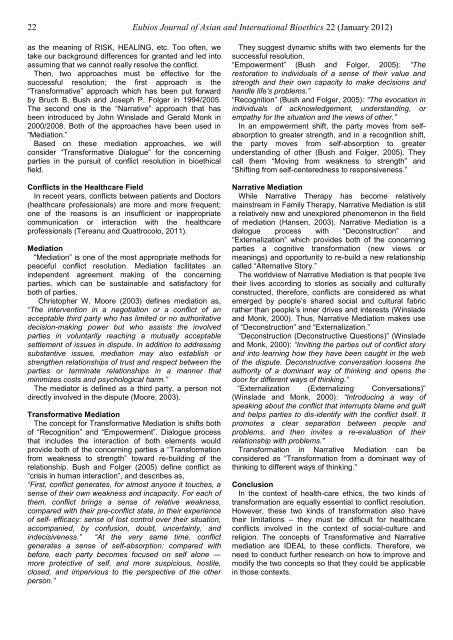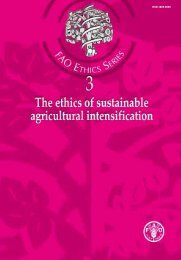Eubios Journal of Asian and International Bioethics - Eubios Ethics ...
Eubios Journal of Asian and International Bioethics - Eubios Ethics ...
Eubios Journal of Asian and International Bioethics - Eubios Ethics ...
You also want an ePaper? Increase the reach of your titles
YUMPU automatically turns print PDFs into web optimized ePapers that Google loves.
22 <strong>Eubios</strong> <strong>Journal</strong> <strong>of</strong> <strong>Asian</strong> <strong>and</strong> <strong>International</strong> <strong>Bioethics</strong> 22 (January 2012)<br />
as the meaning <strong>of</strong> RISK, HEALING, etc. Too <strong>of</strong>ten, we<br />
take our background differences for granted <strong>and</strong> led into<br />
assuming that we cannot really resolve the conflict.<br />
Then, two approaches must be effective for the<br />
successful resolution; the first approach is the<br />
“Transformative” approach which has been put forward<br />
by Bruch B. Bush <strong>and</strong> Joseph P. Folger in 1994/2005.<br />
The second one is the “Narrative” approach that has<br />
been introduced by John Winslade <strong>and</strong> Gerald Monk in<br />
2000/2008. Both <strong>of</strong> the approaches have been used in<br />
“Mediation.”<br />
Based on these mediation approaches, we will<br />
consider “Transformative Dialogue” for the concerning<br />
parties in the pursuit <strong>of</strong> conflict resolution in bioethical<br />
field.<br />
Conflicts in the Healthcare Field<br />
In recent years, conflicts between patients <strong>and</strong> Doctors<br />
(healthcare pr<strong>of</strong>essionals) are more <strong>and</strong> more frequent;<br />
one <strong>of</strong> the reasons is an insufficient or inappropriate<br />
communication or interaction with the healthcare<br />
pr<strong>of</strong>essionals (Tereanu <strong>and</strong> Quattrocolo, 2011).<br />
Mediation<br />
“Mediation” is one <strong>of</strong> the most appropriate methods for<br />
peaceful conflict resolution. Mediation facilitates an<br />
independent agreement making <strong>of</strong> the concerning<br />
parties, which can be sustainable <strong>and</strong> satisfactory for<br />
both <strong>of</strong> parties.<br />
Christopher W. Moore (2003) defines mediation as,<br />
“The intervention in a negotiation or a conflict <strong>of</strong> an<br />
acceptable third party who has limited or no authoritative<br />
decision-making power but who assists the involved<br />
parties in voluntarily reaching a mutually acceptable<br />
settlement <strong>of</strong> issues in dispute. In addition to addressing<br />
substantive issues, mediation may also establish or<br />
strengthen relationships <strong>of</strong> trust <strong>and</strong> respect between the<br />
parties or terminate relationships in a manner that<br />
minimizes costs <strong>and</strong> psychological harm.”<br />
The mediator is defined as a third party, a person not<br />
directly involved in the dispute (Moore, 2003).<br />
Transformative Mediation<br />
The concept for Transformative Mediation is shifts both<br />
<strong>of</strong> “Recognition” <strong>and</strong> “Empowerment”. Dialogue process<br />
that includes the interaction <strong>of</strong> both elements would<br />
provide both <strong>of</strong> the concerning parties a “Transformation<br />
from weakness to strength” toward re-building <strong>of</strong> the<br />
relationship. Bush <strong>and</strong> Folger (2005) define conflict as<br />
“crisis in human interaction”, <strong>and</strong> describes as,<br />
“First, conflict generates, for almost anyone it touches, a<br />
sense <strong>of</strong> their own weakness <strong>and</strong> incapacity. For each <strong>of</strong><br />
them, conflict brings a sense <strong>of</strong> relative weakness,<br />
compared with their pre-conflict state, in their experience<br />
<strong>of</strong> self- efficacy: sense <strong>of</strong> lost control over their situation,<br />
accompanied, by confusion, doubt, uncertainty, <strong>and</strong><br />
indecisiveness.” “At the very same time, conflict<br />
generates a sense <strong>of</strong> self-absorption: compared with<br />
before, each party becomes focused on self alone ―<br />
more protective <strong>of</strong> self, <strong>and</strong> more suspicious, hostile,<br />
closed, <strong>and</strong> impervious to the perspective <strong>of</strong> the other<br />
person.”<br />
They suggest dynamic shifts with two elements for the<br />
successful resolution.<br />
“Empowerment” (Bush <strong>and</strong> Folger, 2005): “The<br />
restoration to individuals <strong>of</strong> a sense <strong>of</strong> their value <strong>and</strong><br />
strength <strong>and</strong> their own capacity to make decisions <strong>and</strong><br />
h<strong>and</strong>le life’s problems.”<br />
“Recognition” (Bush <strong>and</strong> Folger, 2005): “The evocation in<br />
individuals <strong>of</strong> acknowledgement, underst<strong>and</strong>ing, or<br />
empathy for the situation <strong>and</strong> the views <strong>of</strong> other.”<br />
In an empowerment shift, the party moves from selfabsorption<br />
to greater strength, <strong>and</strong> in a recognition shift,<br />
the party moves from self-absorption to greater<br />
underst<strong>and</strong>ing <strong>of</strong> other (Bush <strong>and</strong> Folger, 2005). They<br />
call them “Moving from weakness to strength” <strong>and</strong><br />
“Shifting from self-centeredness to responsiveness.”<br />
Narrative Mediation<br />
While Narrative Therapy has become relatively<br />
mainstream in Family Therapy, Narrative Mediation is still<br />
a relatively new <strong>and</strong> unexplored phenomenon in the field<br />
<strong>of</strong> mediation (Hansen, 2003). Narrative Mediation is a<br />
dialogue process with “Deconstruction” <strong>and</strong><br />
“Externalization” which provides both <strong>of</strong> the concerning<br />
parties a cognitive transformation (new views or<br />
meanings) <strong>and</strong> opportunity to re-build a new relationship<br />
called “Alternative Story.”<br />
The worldview <strong>of</strong> Narrative Mediation is that people live<br />
their lives according to stories as socially <strong>and</strong> culturally<br />
constructed, therefore, conflicts are considered as what<br />
emerged by people’s shared social <strong>and</strong> cultural fabric<br />
rather than people’s inner drives <strong>and</strong> interests (Winslade<br />
<strong>and</strong> Monk, 2000). Thus, Narrative Mediation makes use<br />
<strong>of</strong> “Deconstruction” <strong>and</strong> “Externalization.”<br />
“Deconstruction (Deconstructive Questions)” (Winslade<br />
<strong>and</strong> Monk, 2000): “Inviting the parties out <strong>of</strong> conflict story<br />
<strong>and</strong> into learning how they have been caught in the web<br />
<strong>of</strong> the dispute. Deconstructive conversation loosens the<br />
authority <strong>of</strong> a dominant way <strong>of</strong> thinking <strong>and</strong> opens the<br />
door for different ways <strong>of</strong> thinking.”<br />
“Externalization (Externalizing Conversations)”<br />
(Winslade <strong>and</strong> Monk, 2000): “Introducing a way <strong>of</strong><br />
speaking about the conflict that interrupts blame <strong>and</strong> guilt<br />
<strong>and</strong> helps parties to dis-identify with the conflict itself. It<br />
promotes a clear separation between people <strong>and</strong><br />
problems, <strong>and</strong> then invites a re-evaluation <strong>of</strong> their<br />
relationship with problems.”<br />
Transformation in Narrative Mediation can be<br />
considered as “Transformation from a dominant way <strong>of</strong><br />
thinking to different ways <strong>of</strong> thinking.”<br />
Conclusion<br />
In the context <strong>of</strong> health-care ethics, the two kinds <strong>of</strong><br />
transformation are equally essential to conflict resolution.<br />
However, these two kinds <strong>of</strong> transformation also have<br />
their limitations – they must be difficult for healthcare<br />
conflicts involved in the context <strong>of</strong> social-culture <strong>and</strong><br />
religion. The concepts <strong>of</strong> Transformative <strong>and</strong> Narrative<br />
mediation are IDEAL to these conflicts. Therefore, we<br />
need to conduct further research on how to improve <strong>and</strong><br />
modify the two concepts so that they could be applicable<br />
in those contexts.

















